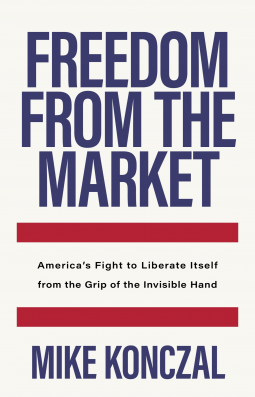
Freedom From the Market
America’s Fight to Liberate Itself from the Grip of the Invisible Hand
by Mike Konczal
This title was previously available on NetGalley and is now archived.
Send NetGalley books directly to your Kindle or Kindle app
1
To read on a Kindle or Kindle app, please add kindle@netgalley.com as an approved email address to receive files in your Amazon account. Click here for step-by-step instructions.
2
Also find your Kindle email address within your Amazon account, and enter it here.
Pub Date Jan 12 2021 | Archive Date Jan 12 2021
Talking about this book? Use #FreedomfromtheMarket #NetGalley. More hashtag tips!
Description
Health insurance, student loan debt, retirement savings, child care, work-life balance, access to home ownership—these are the issues driving America’s current political debates. And they are all linked, as this brilliant and timely book reveals, by a single question: should we allow the free market to determine our lives?
In the tradition of Naomi Klein’s Shock Doctrine, noted economic commentator Mike Konczal answers this question with a resounding no. Freedom from the Market blends passionate political argument and a bold new take on American history to reveal that, from the earliest days of the republic, Americans have defined freedom as what we keep free from the control of the market. With chapters on the history of Homestead Act and land ownership, the eight-hour work day and free time, social insurance and Social Security, World War II day cares, Medicare and desegregation, free public colleges, intellectual property, and the public corporation, Konczal shows how citizens have fought to ensure that everyone has access to the conditions that make us free.
At a time when millions of Americans—and more and more politicians—are questioning the unregulated free market as un-American, Freedom from the Market offers a new narrative, and new intellectual ammunition, for the fight that lies ahead.
Advance Praise
"With carefully selected examples and lucid prose, Konczal makes a convincing case that the American project has long depended on rigorous regulation of capitalism. Progressive voters and policy makers will find plenty of ammunition for their arguments in this cogent history."
—Publishers Weekly
"An economic manifesto on behalf of the 99% poorly served by the present economy."
—Kirkus Reviews
Available Editions
| EDITION | Other Format |
| ISBN | 9781620975374 |
| PRICE | $34.00 (USD) |
Average rating from 3 members
Featured Reviews
I feel like Konczal's book is able to put into words what many people are feeling, but don't really know how to express. The view of free markets as a manifestation of liberty sounds good in theory, but has a lot of flaws. What people don't realize, that I think Konczal does a good job explaining is that many people don't want to throw out all markets, but rather "de-marketize" some aspects of our lives. Sometimes, competition is not good. Rent-seeking behavior and market manipulation puts many people ahead at the expense of others. It also leaves out a lot of morality around the issue: should people be susceptible to the whims of those who have a larger hand in controlling the market?
Konczal also does a nice job explaining the alternative view: that talking about health-care reform, for instance, is socialism and tyranny. But, he does a not job explaining the philosophical shortcomings of such a stance. Reform does not necessarily mean a revolution.
Readers who liked this book also liked:
Peter J. Verovšek
Biographies & Memoirs, Nonfiction (Adult), Politics & Current Affairs













